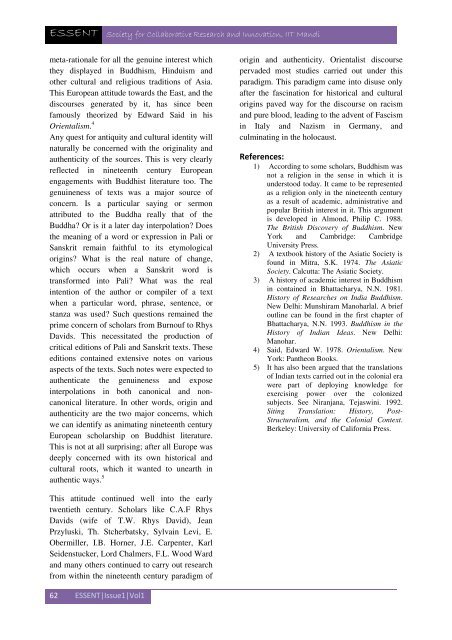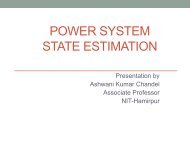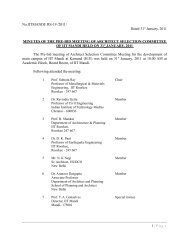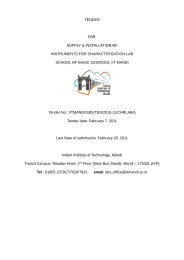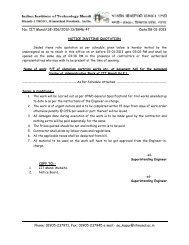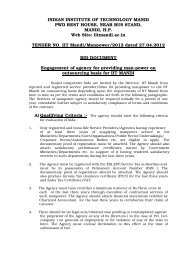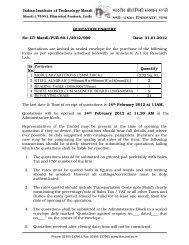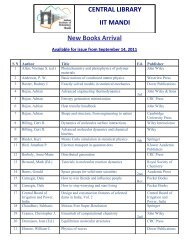Issue1. Vol.1 (April, 2013) - IIT Mandi
Issue1. Vol.1 (April, 2013) - IIT Mandi
Issue1. Vol.1 (April, 2013) - IIT Mandi
- No tags were found...
You also want an ePaper? Increase the reach of your titles
YUMPU automatically turns print PDFs into web optimized ePapers that Google loves.
ESSENT Society for Collaborative Research and Innovation, <strong>IIT</strong> <strong>Mandi</strong>meta-rationale for all the genuine interest whichthey displayed in Buddhism, Hinduism andother cultural and religious traditions of Asia.This European attitude towards the East, and thediscourses generated by it, has since beenfamously theorized by Edward Said in hisOrientalism. 4Any quest for antiquity and cultural identity willnaturally be concerned with the originality andauthenticity of the sources. This is very clearlyreflected in nineteenth century Europeanengagements with Buddhist literature too. Thegenuineness of texts was a major source ofconcern. Is a particular saying or sermonattributed to the Buddha really that of theBuddha? Or is it a later day interpolation? Doesthe meaning of a word or expression in Pali orSanskrit remain faithful to its etymologicalorigins? What is the real nature of change,which occurs when a Sanskrit word istransformed into Pali? What was the realintention of the author or compiler of a textwhen a particular word, phrase, sentence, orstanza was used? Such questions remained theprime concern of scholars from Burnouf to RhysDavids. This necessitated the production ofcritical editions of Pali and Sanskrit texts. Theseeditions contained extensive notes on variousaspects of the texts. Such notes were expected toauthenticate the genuineness and exposeinterpolations in both canonical and noncanonicalliterature. In other words, origin andauthenticity are the two major concerns, whichwe can identify as animating nineteenth centuryEuropean scholarship on Buddhist literature.This is not at all surprising; after all Europe wasdeeply concerned with its own historical andcultural roots, which it wanted to unearth inauthentic ways. 5origin and authenticity. Orientalist discoursepervaded most studies carried out under thisparadigm. This paradigm came into disuse onlyafter the fascination for historical and culturalorigins paved way for the discourse on racismand pure blood, leading to the advent of Fascismin Italy and Nazism in Germany, andculminating in the holocaust.References:1) According to some scholars, Buddhism wasnot a religion in the sense in which it isunderstood today. It came to be representedas a religion only in the nineteenth centuryas a result of academic, administrative andpopular British interest in it. This argumentis developed in Almond, Philip C. 1988.The British Discovery of Buddhism. NewYork and Cambridge: CambridgeUniversity Press.2) A textbook history of the Asiatic Society isfound in Mitra, S.K. 1974. The AsiaticSociety. Calcutta: The Asiatic Society.3) A history of academic interest in Buddhismin contained in Bhattacharya, N.N. 1981.History of Researches on India Buddhism.New Delhi: Munshiram Manoharlal. A briefoutline can be found in the first chapter ofBhattacharya, N.N. 1993. Buddhism in theHistory of Indian Ideas. New Delhi:Manohar.4) Said, Edward W. 1978. Orientalism. NewYork: Pantheon Books.5) It has also been argued that the translationsof Indian texts carried out in the colonial erawere part of deploying knowledge forexercising power over the colonizedsubjects. See Niranjana, Tejaswini. 1992.Siting Translation: History, Post-Structuralism, and the Colonial Context.Berkeley: University of California Press.This attitude continued well into the earlytwentieth century. Scholars like C.A.F RhysDavids (wife of T.W. Rhys David), JeanPrzyluski, Th. Stcherbatsky, Sylvain Levi, E.Obermiller, I.B. Horner, J.E. Carpenter, KarlSeidenstucker, Lord Chalmers, F.L. Wood Wardand many others continued to carry out researchfrom within the nineteenth century paradigm of62 ESSENT|Issue1|Vol1


